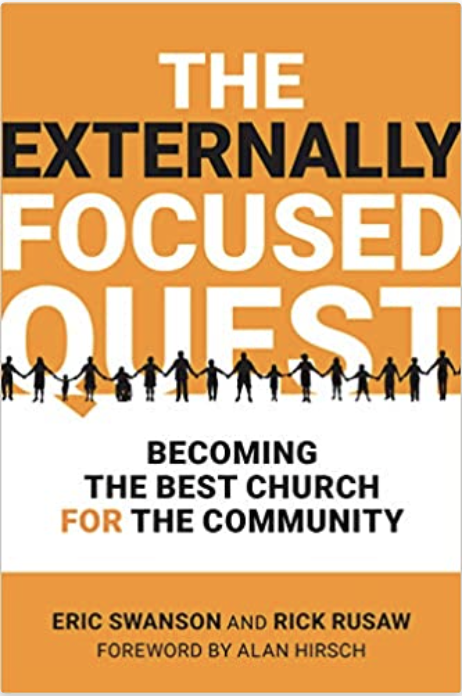Thinking about spiritual growth
One of big issues facing churches today is what they are doing about helping their members develop and grow into followers of Jesus. Call it spiritual growth or spiritual formation; it’s about growing up as a Christian. In 2007 Willow Creek Community Church concluded a multi-year, multi-church study to determine which ministries were actually helping people to spiritually mature. Their conclusion? All of their spiritual activities really weren’t helping people grow. Their growth model, in simplest terms, was that involvement in church activities and programs, over time, leads to growth…but for the most part, it just wasn’t happening! So how do people grow?
Andy Stanley. There are a few competing models for spiritual formation. A couple years ago, at Catalyst Conference my co-worker Warren Bird was interviewing North Point’s Andy Stanley in Leadership Network’s Green Room. I asked if I could sit it and be fly on the wall. After the interview I asked Andy what his approach to spiritual formation was. Andy said the seeds of what he practiced were discovered back in his youth ministry days. When he asked young believers what it was that caused them to grow, the answers fell into 5 categories:
- Good, practical Biblical teaching
- Providential relationships—an influential Christian friend, coach, mentor, disciple, etc
- Private spiritual disciplines—intentional Bible study, quite time, prayer, etc
- Personal service or ministry—a missions trip, discipling others, etc
- Providential circumstances—setback, tragedy, disequilibrium , etc
Spiritual Disciplines. Dallas Willard in The Spirit of the Disciplines writes, "True transformation is possible if we are willing to rearrange our lives around those activities that Jesus engaged in to remain in continual fellowship with his Father and to receive continual power from his Father.” He and others like John Ortberg emphasize that our ability to live the Christian life comes through training…not just trying. We can “try” to run a marathon but without training we will not be able to do so (caveat to this point, I “ran” a marathon back in college without training…finished 5:45, second to last but I did finish….). John Ortberg gives us the following definition: “A discipline is any activity that helps me to do by direct effort, what I cannot now do by direct effort alone.” So spiritual disciplines might include:
- Solitude
- Journaling
- Silence
- Fasting
- Prayer
- Bible Study
- Celebration
- Worship
- Fellowship
Developmental. Developmental Psychologist, James Fowler, outlines a fairly descriptive path of spiritual-state development (http://en.wikipedia.org/wiki/Fowler’s_stages_of_faith_development) in a similar fashion to Erik Erikson’s (http://psychology.about.com/library/bl_psychosocial_summary.htm) work on life stage development. He describes the normal and healthy stages of faith development that we pass through.
Three Day Movement. An attractive subculture of Christianity is found in what is known as the Three Day Movement. The Three Day Movement is based on the observation in the Bible that breakthroughs often happened on the third day (http://en.wikipedia.org/wiki/Third_day_in_the_Bible). Such movements find expression in Emmaus Walks, Cursillo’s, and Tres Dias.
Spiritual growth and learning styles. Another approach to spiritual formation is to overlay spiritual growth to learning styles, made popular by Harvard’s Howard Gardner. Gardner says there are multiple learning styles:
- Logical-mathematical
- Spatial
- Linguistic
- Bodily-kinesthetic
- Musical
- Interpersonal
- Intrapersonal
- Naturalistic
- Existential
Monvee (http://monvee.com/) blends learning styles with spiritual giftedness that results in a customized plan for spiritual growth.
Engage(http://www2.willowcreek.com/Engage/) is Willow Creeks growth plan where each participant takes an assessment and then is given a suggested growth plan to strengthen weaker areas of growth like Bible reading, prayer, community, etc.
What is growth?
In the Bible growth is linked to spiritual maturity and becoming more like Jesus (Romans 8:29, Galatians 4:19, Romans 12:1-2, 2 Corinthians 3:18, Philippians 3:21, 1 John 3:2)
- Our faith can grow: 2 Corinthians 10:15, 2 Thessalonians 1:3
- Our love can grow: 2 Thessalonians 1:3,
- We can grow in grace: 2 Peter 3:18
- We can grow in our knowledge of Jesus: 2 Peter 3:18, Colossians 1:10
Faith, love, grace, and knowledge…not a bad list.
So, what do I think? I think the totality of spiritual growth can be summed up in Matthew 22:37-39; that all of spiritual growth should be measured against increased love for God and increased love of our neighbor. Every discipline, every practice, every habit, every activity is in service to loving God and loving people…don’t you think? At this point in my life I might even say that if Scripture memory or fasting is not resulting in loving God or loving people…try something else.
Spiritual growth isn’t all that complex. I think all of us could plot a point on this graph as to our spiritual position today. And I think with a bit of prayer and guidance we could figure out something we could do to make progress…to grow.
Spiritual growth and discipleship
Imagine, as a discipler or mentor, sitting down with a new believer and casting a vision for what this year will bring. “Everything we do, everything we study, every activity is designed to help us genuinely love God more or love our neighbors more. A fair question to ask is, ‘How is this helping me love God? How is this helping me have room in my heart this year for someone that I didn’t have room in my life for last year?’ Every ministry activity is designed to help us make progress in one or both of these areas.” I think that would be a new day for spiritual formation…doing what Jesus said is most important….What do you think?
A mission statement worth living for
How would this be for a mission statement or purpose statement.
“To love God and love people and encourage others to do the same”
It doesn’t get simpler or better than that. What do you think?

![clip_image002[4] clip_image002[4]](http://ericjswanson.com/wp-content/uploads/2012/07/clip_image0024_thumb.gif)







